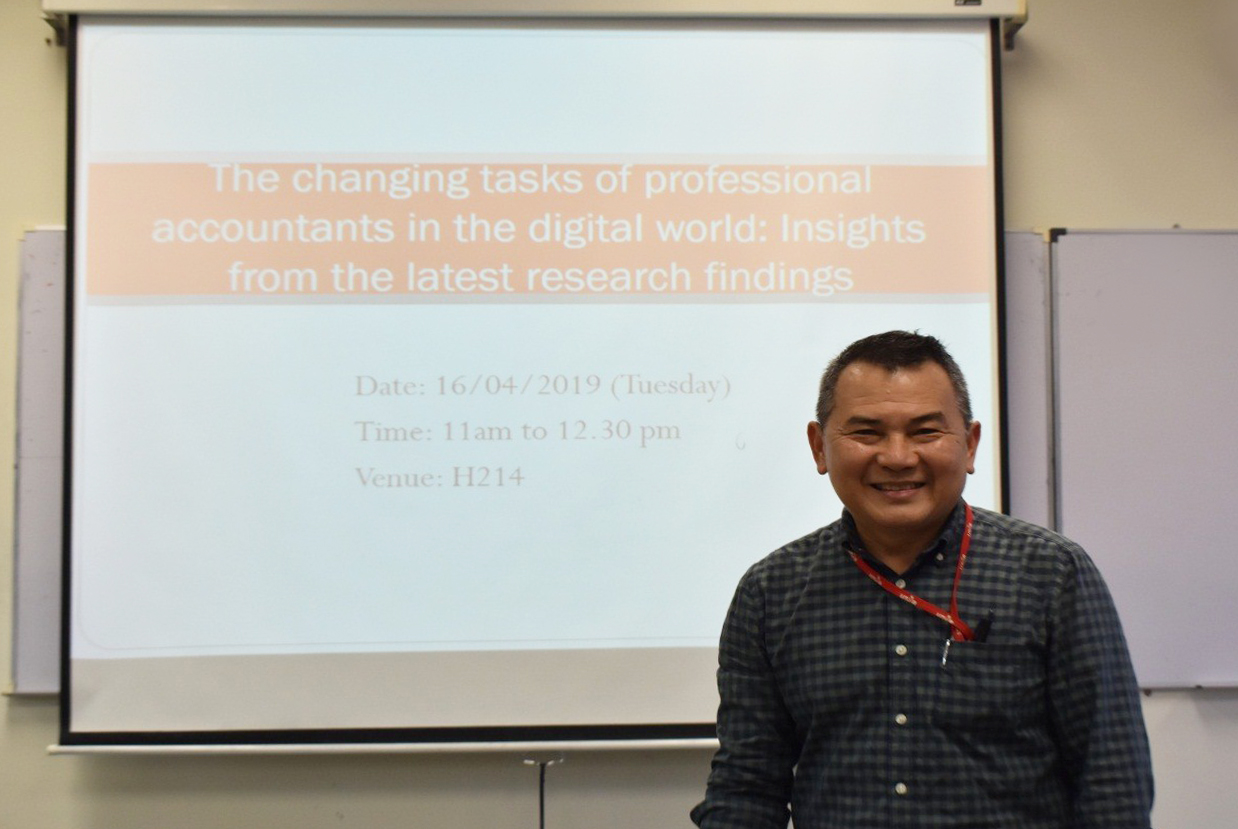

The Centre for Accounting, Banking and Finance (CABF) parked under the Faculty of Business and Finance (FBF) organised a talk titled “The changing tasks of professional accountants in the digital world: Insights from the latest research findings” on 16 April 2019 at UTAR Kampar Campus.
The talk was presented by the FBF Department of Commerce and Accountancy Academic Dr Wong Kee Luen. Academics from FBF and other faculties were present at the talk.
Dr Wong began his talk by sharing the common perceptions regarding the impact of the digital world on accountants. The perceptions held were that accountants generally face a bleak future from the risks of being replaced by automation and computerisation.
However, Dr Wong opined that there is hope for accountants who take on new roles and competencies. In a global study conducted in 2018 by the Association of International Certified Professional Accountants (AICPA-CIMA JV) which has been published in 2019 as a white paper, concluded that the new opportunities for accountants are positive. The study aimed to understand the management community’s needs in the digital world. A three-phased methodology was adopted which consisted of interviews, roundtables and a global survey. The interviews and roundtables involved over 800 participants from organisations in 20 countries, while the survey was conducted on 4,700 respondents across the world.

Dr Wong introducing his research
The first part of the study explored the tasks and activities of the accountants. Findings show that respondents desired to do more on advising and applying compared to assembling information and analysing for insights. These responses were likewise reflected as their preferred future roles and activities. Dr Wong added that the activities of advising and applying would face the least risk of being replaced by technological automation. Furthermore, as tasks of assembling and analysing information become more automated, accountants can focus more on the activities of advising and applying.
The report highlighted seven technologies that have impacts on the finance function. These technologies are categorised as core modernisation and exponentials. Core modernisation technologies are cloud computing, process robotics and visualisation. Exponentials technologies are advanced analytics, cognitive computing, in-memory computing and blockchain. Based on the findings, only cloud technologies are the mainstream feature of many organisations’ finance functions. For exponential tools, only advanced analytics are mostly used.
Dr Wong mentioned that technological automation also impacts the structure of the finance function. Based on the report findings, he showed that the finance function is evolving into a pentagon shaped structure from the more traditional triangular base shape. As finance activities at the base of the triangle become automated and thus removed, a pentagon shape structure remains. Activities which are targeted for automation comprise lower level activities and tasks such as assembling and extracting data and analysing for insights. He added that higher level finance functions such as advising to influence and applying for impact cannot be computerised and thus remain in the pentagon shape structure.
Dr Wong concluded that while many people feel that the digital age could present a threat, it can also present opportunities. For example, technology can be used to improve forecasting thus saving time and energy to be focused elsewhere on key issues that can add more value to the company. In this respect, technology and automation can be both a driver and an enabler of change.
The interesting talk was followed by a lively Q&A session.
© 2019 UNIVERSITI TUNKU ABDUL RAHMAN DU012(A).
Wholly owned by UTAR Education Foundation Co. No. 578227-M LEGAL STATEMENT TERM OF USAGE PRIVACY NOTICE